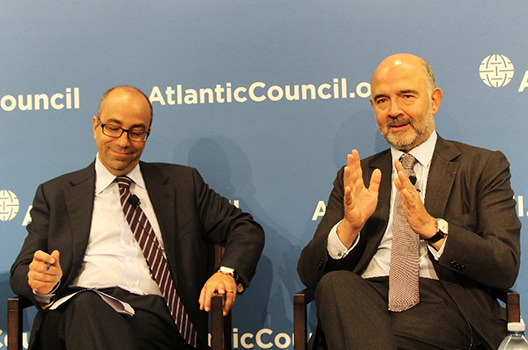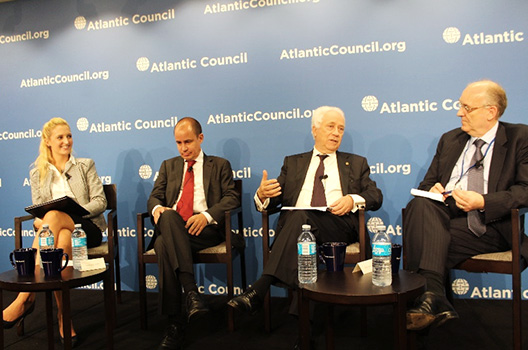 Pierre Moscovici, EU commissioner for economic and financial affairs, taxation, and customs, visited the Atlantic Council on October 6 as part of the “Stronger With Allies: The Future of Europe After Brexit” conference cohosted by the Atlantic Council’s Future Europe Initiative and the Global Business & Economics Program, and the Slovak Presidency of the Council of the European Union.
Pierre Moscovici, EU commissioner for economic and financial affairs, taxation, and customs, visited the Atlantic Council on October 6 as part of the “Stronger With Allies: The Future of Europe After Brexit” conference cohosted by the Atlantic Council’s Future Europe Initiative and the Global Business & Economics Program, and the Slovak Presidency of the Council of the European Union.
Ahead of the October 15 deadline for member states of the Eurozone to hand in their national budgets, the Commissioner addressed how Europe will continue abiding by the EU budgetary rules with flexibility and intelligence. While he thinks that the European economy has turned a corner, he made clear that “there is no time for complacency.” While monetary policy is important to address Europe’s lingering weaknesses, Commissioner Moscovici stressed that “monetary policy is not the only game in town.” Instead, he suggested a combination of structural reforms, determined support or investment, and responsible fiscal policy.
Looking forward, he sees three possible avenues for progress on the fiscal front in Europe:
1) Simplified but intelligent rules to enhance transparency and democratic oversight
2) Flexibility within the existing framework
3) An overall EU fiscal stance
Following the discussion with Commissioner Moscovici, Marie Kasperek, assistant director of the Global Business & Economics Program, moderated a panel discussion, consisting of Bart Oosterveld, chief credit officer of Moody’s Investor Services; Carlos Costa, governor of the Bank of Portugal; and Dr. Paul Sheard, chief economist for Standard & Poor’s Global.

Image: Andrea Montanino, director of the Atlantic Council’s Global Business & Economics Program, and Pierre Moscovici, EU commissioner for economic and financial affairs, taxation, and customs, engage in a discussion on the deliverables for the European Commission to spur prosperity and growth in Europe for the next twelve months.
